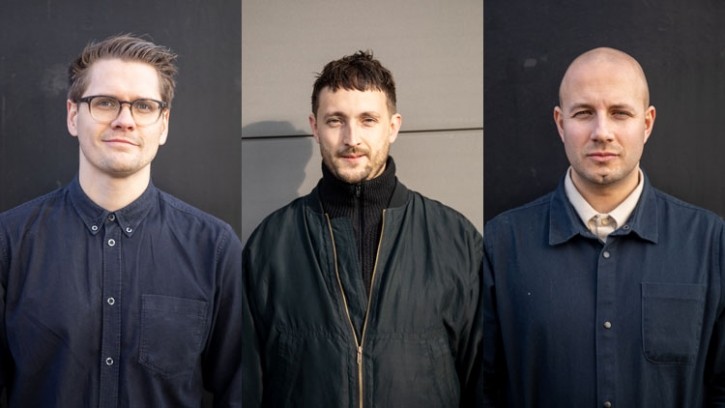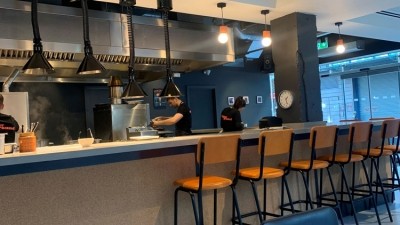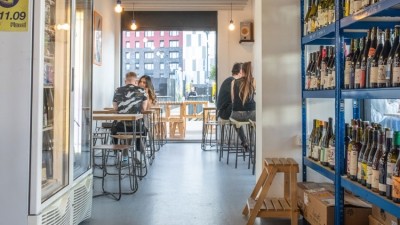Joseph Otway: “With just 40 guests a night, we can really elevate what we do”

This clearly isn't a money-making endeavour. Why do it?
Richard Cossins: We’re certainly losing money on it. We’re flying a total of six people out to serve two dinners and a Sunday lunch.
Joseph Otway: In some respects we are going back to our roots. Prior to launching Flawd and Higher Ground in Manchester, we ran similar events.
Daniel Craig Martin: It’s also about reconnecting with an ex-colleague from our days at Blue Hill at Stone Barns (chef Dan Barber’s influential New York State farm-to-table restaurant). Iming Lin was a field apprentice at the Stone Barns Centre for Food & Agriculture (which supplies Barber’s restaurants). We met her due to the cross pollination between the farm and the restaurant and had a lot of opportunities to learn together as well as become good friends. She now has her own market garden near Cape Town called Meuse Farm, which supplies some of the area’s best restaurants with amazing organic produce. The dinners are happening on the farm. They have a beautiful timber outbuilding that has views of the garden with the mountains in the background.
What is she doing that is so different?
RC: Her approach is very experimental. In terms of the plantings, everything is deeply considered and all reverts back to the overall soil health of each piece of land. She took a lot of seeds with her from Stone Barns and is focused on seed saving.
JO: Seed saving is a real labour of love. You grow, say, 10 different varieties of tomatoes one summer and, after eating them, you decide which ones taste the best and save those seeds. Then you do it all over again. That way, you are selecting the seeds that create the most delicious fruit. This is not how agriculture usually works. In general, varieties are selected for their yield, how they look, and how shelf-stable they are.
DCM: It's only very small-scale production that gives you the time and focus necessary to do these things. It's the opposite of the industrial model.
Are there parallels with your own Cinderwood Market Garden?
RC: Yes. But she has a lot more experience than us and is further along in her journey, they are now on their seventh growing season and we are only on our third.
JO: Iming has also sent us some of her seeds to trial at Cinderwood Market Garden. Some of them didn’t work out because of the obvious climatic differences between the North West of England and the southern tip of Africa. But some of them produced incredible things.
What's going to be on the menu?
JO: It will be the height of summer out there so we will have access to lots of things we can’t grow in the UK. The only fresh produce we use from outside the UK are organic lemons. It starts to get dreary around this time of year, you’re basically just talking roots and brassicas. To go over there and have access to heirloom tomatoes, courgettes and melons is going to be very exciting. The menus will be fruit and vegetable-led, but we will also have some animal protein.
How will the overall experience differ from your places in Manchester?
JO: It will be much more experiential and narrative-driven. We’re very happy with what we have in the North West but things didn’t quite go as expected because of the pandemic. We have ended up with a low-key natural wine bar (Flawd) and a relatively high-volume bistro (Higher Ground). With just 40 guests a night we can really elevate what we do and engage with our guests about our and Iming’s story.
What about the wine side of things?
DCM: At Flawd and Higher Ground we work exclusively with low intervention natural wines makers. One producer with whom we have always had a close relationship is Craig Hawkins (the founder of the Swartland-based Testalonga). He has been pioneering organic farming, a low intervention approach and skin contact orange-style wines since 2008. He’s a very influential winemaker. We’re honoured to be using his wines for the event. He’s also coming to pour on one of the nights.
Is this a preview of what you plan to create at Cinderwood Market Garden at some point?
JO: Potentially. It's something we talk about in the five-to-ten-year vision of what we want to do.
RC: Our previous boss Dan Barber will be extremely excited to see this collaboration occur. There is potential to do more of these in the coming years with various ex-colleagues and friends who have established farms and restaurants around the world.
Higher Ground launched a little under a year ago. How is it going?
JO: We're pushing on. We have stuck to the initial ethos and mission – we use organic vegetables exclusively and get whole animals in. We still have the same crew that we started with, which has allowed us to evolve at quite a pace. It’s still quite a rustic experience but our processes are more consistent now. We’re also doing a lot more covers than we were when we started out – 400-500 a week (across six services). Even with that volume, the majority of our vegetables still comes from Cinderwood.
The price point is low given your background and the quality of the produce you use. How do you do it?
JO: Our policy is to largely just use what we have in our stores. That forces us to think creatively about how we go about things. But I’m not a big fan of the term zero waste, although I would not criticise other chefs for using it if that is there thing. We are very careful with how we use everything and waste very little, but occasionally things do go in the bin. We are not doing things like making tomato skins into powders and fermenting pumpkin skins into kombucha. Whole animals are key to bringing our food costs down. We’re not paying for anyone else’s labour, and we can sell every bit of it. We use offal to make ragùs for our pasta course, for example.
RC: We are economical about things. That approach requires flexibility from both the kitchen team and our customers. Typically, we just put ‘lamb’ on the menu and tell people what cut they are getting as we bring the food over.
DCM: Our sharing menu is currently £45 but will soon rise to £55 (at dinner). We think that represents good value. But that’s still a significant sum for many of our customers. We are not in London, where a bit over £100 for two would be seen as inexpensive for many restaurant goers.






















